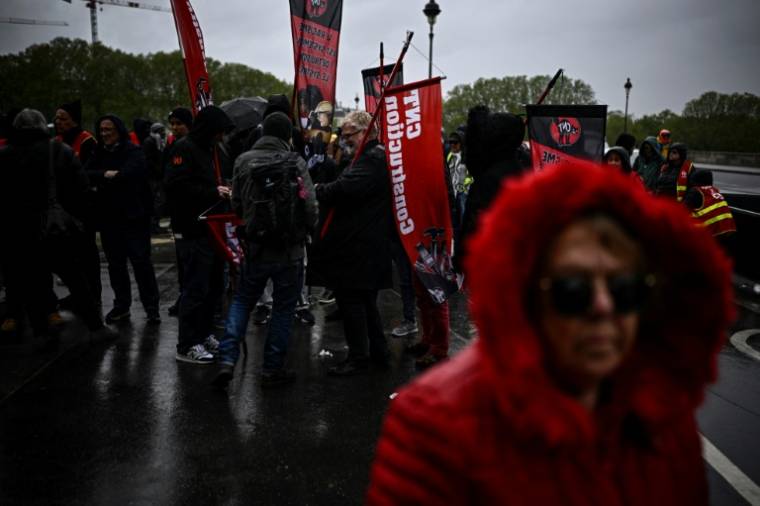Family and supporters pay tribute to Amara Dioumassy, who died on the construction site of a basin intended to make the Seine swimmable during the Olympic Games, in Paris, April 27, 2024 (AFP / JULIEN DE ROSA)
Bring this “modest death” out of oblivion: supporters and family paid tribute on Saturday in Paris to Amara Dioumassy, who died on the construction site of a basin intended to make the Seine swimmable during the Olympic Games, inaugurated with great fanfare next week .
The team leader of Malian origin Amara Dioumassy, 51 years old and father of 12 children, died on June 16, 2023 in the Austerlitz basin, struck by a construction truck which was reversing without a reversing beep.
Around a hundred union activists and members of her family, some in tears, gathered on Saturday in pouring rain at the scene of the tragedy to demand “recognition and justice for Amara”.
“No action has been done for the family” and “his children are starving,” said his brother, Bally, 38, wearing a CGT flag as a bandana.
“We wanted to hide this death,” accuses Lyes Chouaï, CGT union delegate of SADE, a subsidiary of Veolia which employed Amara, and co-organizer of the tribute, interviewed by AFP.

Gathering in Paris to pay tribute to Amara Dioumassy who died on a construction site intended to make the Seine swimmable during the Olympic Games, April 27, 2024 (AFP / JULIEN DE ROSA)
A CGT activist called out to passers-by to remind them that a worker had died there almost a year ago, without arousing their interest.
“He died at the foot of the forensic institute (site of the construction site, Editor’s note), they came to note his death, he was transported directly to the institute, from where he was sent back to be buried in Mali “, says Lyes Chouaï, who worked with Amara.
The supporters of this experienced construction worker denounce serious safety breaches on this site managed by SADE, with the City of Paris as principal.
Asked by AFP, the Paris town hall and Veolia recalled that the judicial investigation was still underway to “determine responsibilities”, ensuring that they had “fully cooperated”.
– “Indecent” –
For Mr. Chouaï, Saturday’s tribute was intended to appeal to “as many people as possible about this modest death alongside these Games which will be seen by the whole world”.
The ceremony comes on the eve of World Safety at Work Day, of which France is a bad student, with two people dying every day in the workplace, the worst incidence in the European Union.

Gathering on the Austerlitz bridge in Paris, April 24, 2024, to pay tribute to Amara Dioumassy, who died on the Austerlitz basin construction site intended to make the Seine swimmable during the Olympic Games (AFP / JULIEN DE ROSA)
The demonstrators also expressed “pain” and “anger” before the inauguration of the Austerlitz basin, scheduled for Thursday, during which the town hall said it wanted to “pay tribute” to Amara Dioumassy.
“We were harassed by the Paris town hall to find out if there could be family at the inauguration. It’s a little indecent,” said Mr. Chouaï.
“Shame on Paris town hall!”, reacted Bally Dioumassy.
Unlike the vast majority of Olympic projects in Ile-de-France managed by Solideo, the public establishment responsible for infrastructure for the competitions, the Austerlitz basin is managed by the City of Paris.
This project “really seemed unacceptable to us in terms of safety standards” and we had to “move quickly to meet deadlines”, according to the trade unionist.
The van which hit Amara “did not have a reversing beep to alert it of its passage, there was no marking on the ground of the direction of movement of the vehicles”, lists Mr. Chouaï.
“Amara had stored equipment in a container, on the edge of a single traffic lane which was not demarcated between machines and pedestrians,” he adds.
After Amara’s death and the passage of the labor inspection which stopped the construction site for 10 days, “everything was put back in place gradually, but this should have been done from the start”, laments- he.
